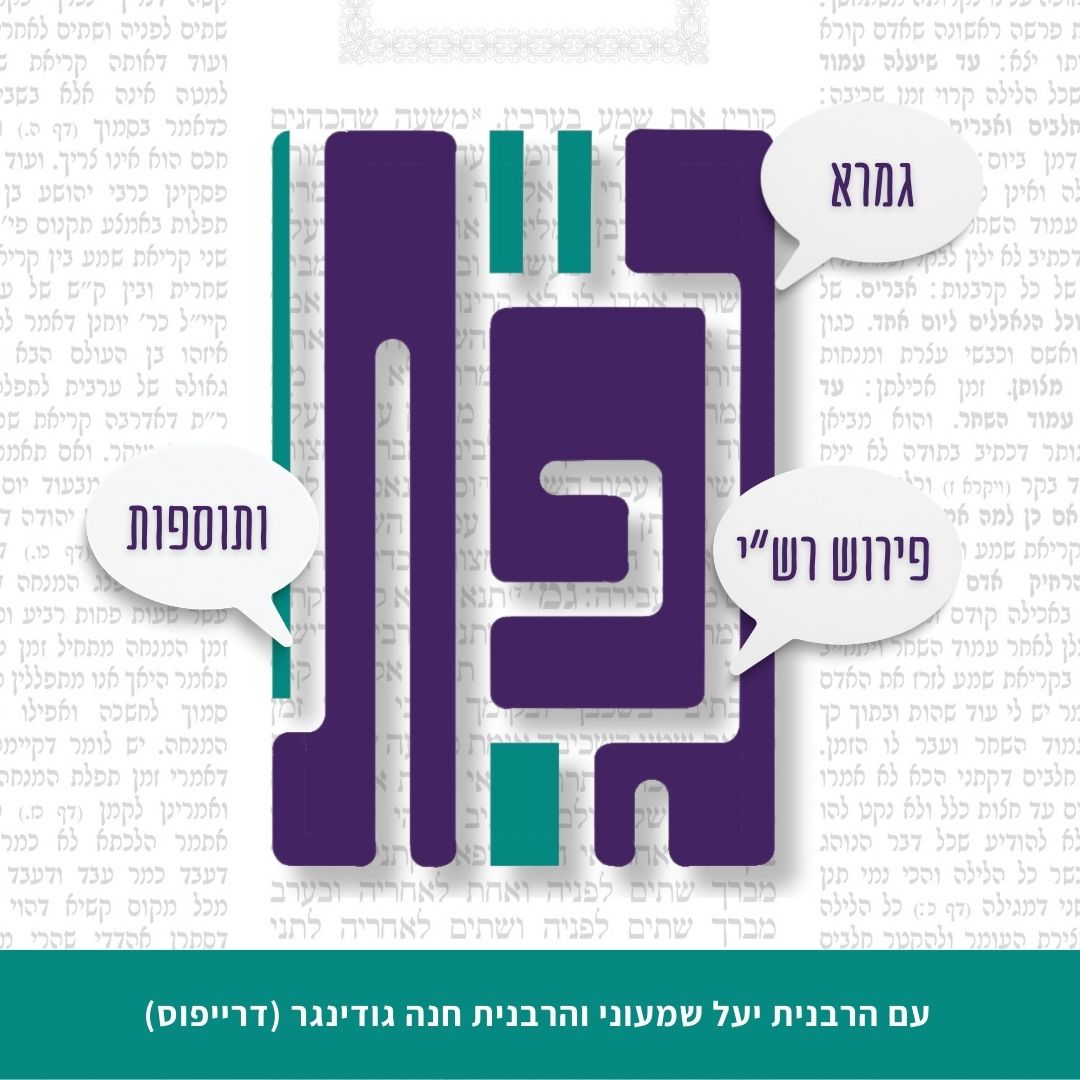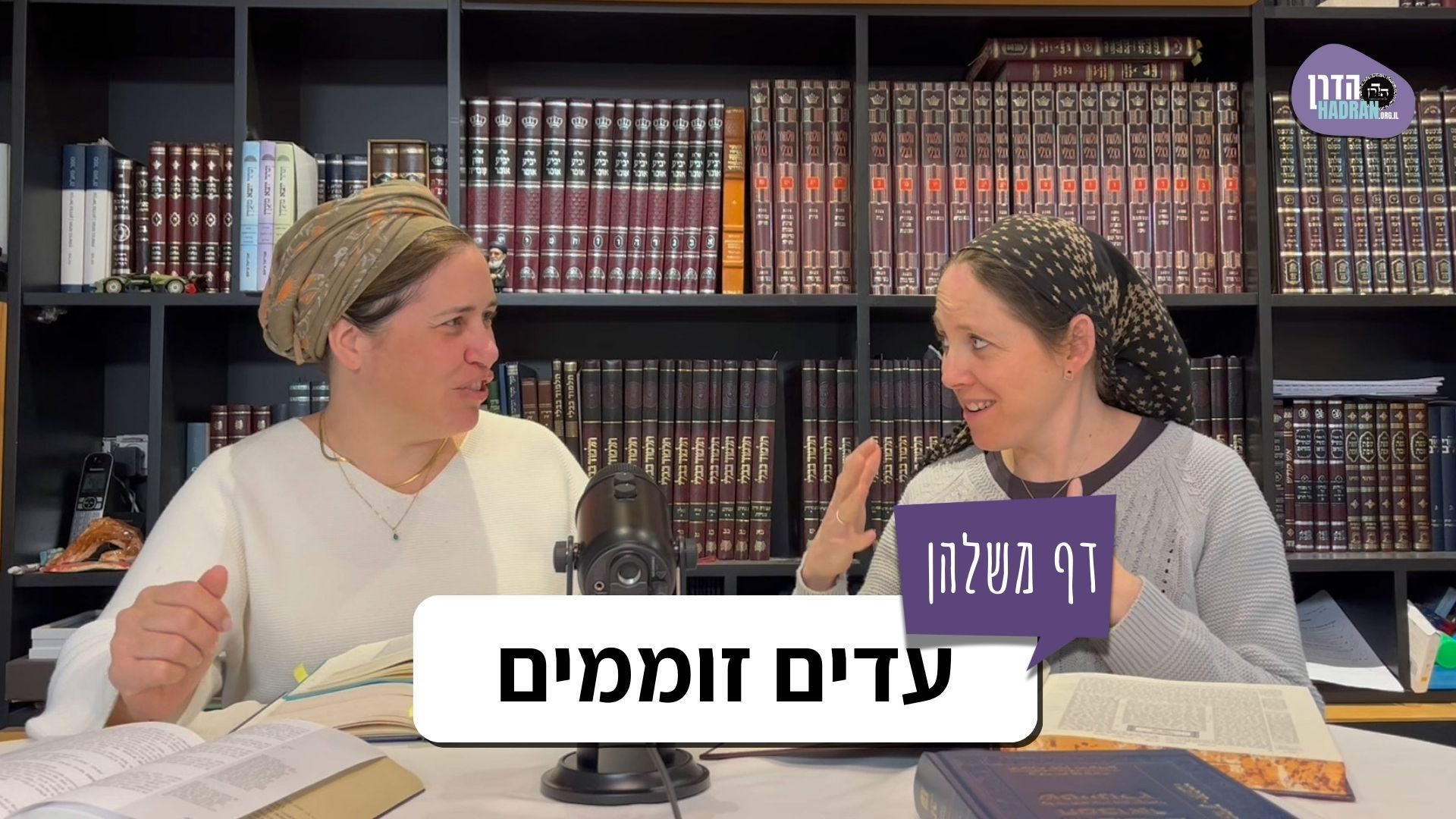מכות יג
מַעֲלִים הָיוּ שָׂכָר לַלְוִיִּם, דִּבְרֵי רַבִּי יְהוּדָה. רַבִּי מֵאִיר אוֹמֵר: לֹא הָיוּ מַעֲלִים לָהֶן שָׂכָר. וְחוֹזֵר לִשְׂרָרָה שֶׁהָיָה בָּהּ, דִּבְרֵי רַבִּי מֵאִיר. רַבִּי יְהוּדָה אוֹמֵר: לֹא הָיָה חוֹזֵר לִשְׂרָרָה שֶׁהָיָה בָּהּ.
The unintentional murderers would pay a fee to the Levites as rent for their living quarters in the cities of refuge, which were Levite cities; this is the statement of Rabbi Yehuda. Rabbi Meir says: They would not pay a fee to them, but would reside rent free, as they are required to live there by Torah law. They also disagreed with regard to the status of the unintentional murderer when he returns home after the death of the High Priest. He returns to the same public office that he occupied prior to his exile; this is the statement of Rabbi Meir. Rabbi Yehuda says: He does not return to the office that he occupied.
גְּמָ׳ אָמַר רַב כָּהֲנָא: מַחֲלוֹקֶת בְּשֵׁשׁ, דְּמָר סָבַר ״לָכֶם״ – לִקְלִיטָה. וּמָר סָבַר: ״לָכֶם״ – לְכׇל צׇרְכֵיכֶם. אֲבָל בְּאַרְבָּעִים וּשְׁתַּיִם – דִּבְרֵי הַכֹּל הָיוּ מַעֲלִין לָהֶם שָׂכָר.
GEMARA: Rav Kahana said: This dispute between Rabbi Yehuda and Rabbi Meir is with regard to payment of rent to the Levite landlords in the six cities of refuge designated in the Torah and in the book of Joshua, as one Sage, Rabbi Yehuda, holds that in the verse: “They shall be cities of refuge for you” (Numbers 35:11), the term “for you” means that the cities shall be for you only for providing refuge, and therefore they must pay rent to the Levites. And one Sage, Rabbi Meir, holds that the term “for you” means for all your needs; therefore, they are not required to pay rent. But with regard to the forty-two additional Levite cities, which also served as cities of refuge, everyone agrees that the unintentional murderers would pay rent to the Levite landlords.
אֲמַר לֵיהּ רָבָא: הָא וַדַּאי ״לָכֶם״ – לְכׇל צׇרְכֵיכֶם מַשְׁמַע. אֶלָּא אָמַר רָבָא: מַחֲלוֹקֶת בְּאַרְבָּעִים וּשְׁתַּיִם, דְּמָר סָבַר: ״וַעֲלֵיהֶם תִּתְּנוּ״ – כִּי הָנָךְ לִקְלִיטָה. וּמָר סָבַר: ״וַעֲלֵיהֶם תִּתְּנוּ״ – כִּי הָנָךְ, מָה הָנָךְ לְכׇל צׇרְכֵיכֶם, אַף הָנֵי נָמֵי – לְכׇל צׇרְכֵיכֶם, אֲבָל בְּשֵׁשׁ – דִּבְרֵי הַכֹּל לֹא הָיוּ מַעֲלִים לָהֶן שָׂכָר.
Rava said to him: But the term “for you” certainly indicates for all your needs; therefore, the dispute cannot be as Rav Kahana explains it. Rather, Rava said: The dispute is only with regard to the forty-two Levite cities, as one Sage, Rabbi Yehuda, holds that from the verse: “They shall be the six cities of refuge…and beside them you shall give forty-two cities” (Numbers 35:6), it is derived that the forty-two cities are like these original six cities, only insofar as with regard to the unintentional murderer being admitted. And one Sage, Rabbi Meir, holds that from the verse: “They shall be the six cities of refuge…and beside them you shall give forty-two cities,” it is derived that the forty-two cities are like these original six cities in every sense: Just as those six cities were given to you, i.e., the unintentional murderers, for all your needs, so too, these forty-two cities were given to you, i.e., the unintentional murderers, for all your needs. But with regard to the six cities specifically designated as cities of refuge, everyone agrees that unintentional murderers would not pay the Levites a fee.
חוֹזֵר לִשְׂרָרָה שֶׁהָיָה בָּהּ כּוּ׳. תָּנוּ רַבָּנַן: ״וְשָׁב אֶל מִשְׁפַּחְתּוֹ וְאֶל אֲחֻזַּת אֲבוֹתָיו יָשׁוּב״ – לְמִשְׁפַּחְתּוֹ הוּא שָׁב, וְאֵינוֹ שָׁב לְמַה שֶּׁהֶחְזִיקוּ אֲבוֹתָיו, דִּבְרֵי רַבִּי יְהוּדָה. רַבִּי מֵאִיר אוֹמֵר: אַף הוּא שָׁב לְמַה שֶּׁהֶחְזִיקוּ אֲבוֹתָיו, ״אֶל אֲחֻזַּת אֲבוֹתָיו״ – כַּאֲבוֹתָיו.
§ The mishna teaches that there is a dispute as to whether the unintentional murderer returns to the same public office that he occupied prior to his exile. On a related note, the Sages taught with regard to a Hebrew slave liberated during the Jubilee Year, about whom it is written: “And he returns to his family, and to the estate of his fathers he shall return” (Leviticus 25:41): He returns to his family, but he does not return to that status of prominence and honor that his ancestors held; this is the statement of Rabbi Yehuda. Rabbi Meir says: He even returns to that status of prominence and honor that his ancestors held. From the phrase “to the estate of his fathers he shall return,” it is derived that he returns to be like his fathers.
וְכֵן בַּגּוֹלָה, כְּשֶׁהוּא אוֹמֵר ״יָשׁוּב״ – לְרַבּוֹת אֶת הָרוֹצֵחַ.
And likewise, the same is true with regard to an exile sent to a city of refuge, as when the verse states: “To the estate of his fathers he shall return,” the term “he shall return” is redundant and it serves to include the unintentional murderer.
מַאי ״וְכֵן בַּגּוֹלָה״? כִּדְתַנְיָא: ״יָשׁוּב הָרֹצֵחַ אֶל אֶרֶץ אֲחֻזָּתוֹ״ – לְאֶרֶץ אֲחוּזָּתוֹ הוּא שָׁב, וְאֵינוֹ שָׁב לְמַה שֶּׁהֶחְזִיקוּ אֲבוֹתָיו, דִּבְרֵי רַבִּי יְהוּדָה. רַבִּי מֵאִיר אוֹמֵר: אַף הוּא שָׁב לְמַה שֶּׁהֶחְזִיקוּ אֲבוֹתָיו – גָּמַר שִׁיבָה שִׁיבָה מֵהָתָם.
The Gemara asks: What is the meaning of: And likewise, the same is true with regard to an exile? The Gemara explains: It is as it is taught in a baraita with regard to the verse: “The murderer shall return to his ancestral land” (Numbers 35:28), from which it is derived that he returns to his ancestral land, but he does not return to that status of prominence and honor that his ancestors held; this is the statement of Rabbi Yehuda. Rabbi Meir says: He even returns to that status of prominence and honor that his ancestors held. Rabbi Meir derives this by means of a verbal analogy from there, i.e., between the term of “return” written with regard to the unintentional murderer, and the term of “return” written with regard to the Hebrew slave. The verbal analogy teaches that just as a Hebrew slave returns to his father’s estate and the status of prominence held by his ancestors, so too, the unintentional murderer returns to his ancestral land and to the status of prominence held by his ancestors.
הֲדַרַן עֲלָךְ אֵלּוּ הֵן הַגּוֹלִין
מַתְנִי׳ אֵלּוּ הֵן הַלּוֹקִין: הַבָּא עַל אֲחוֹתוֹ, וְעַל אֲחוֹת אָבִיו, וְעַל אֲחוֹת אִמּוֹ, וְעַל אֲחוֹת אִשְׁתּוֹ, וְעַל אֵשֶׁת אָחִיו, וְעַל אֵשֶׁת אֲחִי אָבִיו, וְעַל הַנִּדָּה. אַלְמָנָה לְכֹהֵן גָּדוֹל, גְּרוּשָׁה וַחֲלוּצָה לְכֹהֵן הֶדְיוֹט, מַמְזֶרֶת וּנְתִינָה לְיִשְׂרָאֵל, בַּת יִשְׂרָאֵל לְנָתִין וּלְמַמְזֵר.
MISHNA: After enumerating in tractate Sanhedrin those liable to be executed and in the previous chapter those liable to be exiled, the mishna proceeds to enumerate those liable to receive lashes. These are the people who are flogged by Torah law for violating a prohibition: One who engages in intercourse with his sister, or with his father’s sister, or with his mother’s sister, or with his wife’s sister, or with his brother’s wife, or with the wife of his father’s brother, or with a menstruating woman. Likewise, one is flogged in the case of a widow who married a High Priest, a divorcée or a ḥalutza who married an ordinary priest, a mamzeret, i.e., a daughter born from an incestuous or adulterous relationship, or a Gibeonite woman who married a Jew of unflawed lineage, and a Jewish woman of unflawed lineage who married a Gibeonite or a mamzer, i.e., a son born from an incestuous or adulterous relationship.
אַלְמָנָה וּגְרוּשָׁה – חַיָּיבִין עָלֶיהָ מִשּׁוּם שְׁנֵי שֵׁמוֹת. גְּרוּשָׁה וַחֲלוּצָה – אֵינוֹ חַיָּיב אֶלָּא מִשּׁוּם אַחַת בִּלְבַד.
The mishna elaborates: If a woman was both a widow and a divorcée, as after she was widowed she remarried and was divorced, a High Priest is liable to receive two sets of lashes for marrying her due to the violation of two different prohibitions, that of his marrying a widow and that of his marrying a divorced woman. If a woman was both a divorcée and a ḥalutza, from two different men, an ordinary priest who marries her is liable to receive only one set of lashes, due to the violation of one prohibition alone.
הַטָּמֵא שֶׁאָכַל אֶת הַקֹּדֶשׁ, וְהַבָּא אֶל הַמִּקְדָּשׁ טָמֵא, וְאוֹכֵל חֵלֶב, וָדָם וְנוֹתָר וּפִגּוּל וְטָמֵא.
The mishna continues enumerating those liable to receive lashes: A ritually impure person who ate sacrificial food and one who entered the Temple while ritually impure. And one who eats the forbidden fat of a domesticated animal; or blood; or notar, leftover flesh from an offering after the time allotted for its consumption; or piggul, an offering invalidated due to intent to sprinkle its blood, burn its fats on the altar, or consume it, beyond its designated time; or one who partakes of an offering that became impure, is flogged.
וְהַשּׁוֹחֵט וּמַעֲלֶה בַּחוּץ, וְהָאוֹכֵל חָמֵץ בְּפֶסַח, וְהָאוֹכֵל וְהָעוֹשֶׂה מְלָאכָה בְּיוֹם הַכִּפּוּרִים, וְהַמְפַטֵּם אֶת הַשֶּׁמֶן, וְהַמְפַטֵּם אֶת הַקְּטוֹרֶת, וְהַסָּךְ בְּשֶׁמֶן הַמִּשְׁחָה, וְהָאוֹכֵל נְבֵילוֹת וּטְרֵיפוֹת שְׁקָצִים וּרְמָשִׂים.
And one who slaughters a sacrificial animal or sacrifices it on an altar outside the Temple courtyard, and one who eats leavened bread on Passover, and one who eats on Yom Kippur and one who performs labor on Yom Kippur, and one who blends the anointing oil for non-sacred use, and one who blends the incense that was burned on the altar in the Sanctuary for non-sacred use, and one who applies the anointing oil, and one who eats unslaughtered animal or bird carcasses, or tereifot, which are animals or birds with a condition that will lead to their death within twelve months, or repugnant creatures, or creeping animals, is liable to receive lashes.
אָכַל טֶבֶל וּמַעֲשֵׂר רִאשׁוֹן שֶׁלֹּא נִטְּלָה תְּרוּמָתוֹ, וּמַעֲשֵׂר שֵׁנִי וְהֶקְדֵּשׁ שֶׁלֹּא נִפְדּוּ.
If one ate untithed produce, i.e., produce from which terumot and tithes were not separated; or first-tithe produce whose teruma of the tithe was not taken; or second-tithe produce or sacrificial food that was not redeemed; he is liable to receive lashes.
כַּמָּה יֹאכַל מִן הַטֶּבֶל וִיהֵא חַיָּיב? רַבִּי שִׁמְעוֹן אוֹמֵר: כׇּל שֶׁהוּא. וַחֲכָמִים אוֹמְרִים: כְּזַיִת. אָמַר לָהֶן רַבִּי שִׁמְעוֹן: אִי אַתֶּם מוֹדִים לִי בְּאוֹכֵל נְמָלָה כׇּל שֶׁהוּא שֶׁהוּא חַיָּיב? אָמְרוּ לוֹ: מִפְּנֵי שֶׁהִיא כִּבְרִיָּיתָהּ. אָמַר לָהֶן: אַף חִטָּה אַחַת כִּבְרִיָּיתָהּ.
With regard to the measure for liability for eating forbidden food, the mishna asks: How much does one need to eat from untithed produce to be liable to receive lashes? Rabbi Shimon says: If one ate any amount of untithed produce he is liable to receive lashes. And the Rabbis say: He is liable only if he eats an olive-bulk, which is the minimum measure characterized as eating. Rabbi Shimon said to them: Do you not concede to me with regard to one who eats an ant of any size that he is liable to receive lashes? The Rabbis said to Rabbi Shimon: He receives lashes for eating an ant of any size due to the fact that it is an intact entity in the form of its creation, and that is what the Torah prohibited. Rabbi Shimon said to them: One kernel of wheat is also in the form of its creation, and therefore one should be liable to receive lashes for eating any intact entity.
גְּמָ׳ חַיָּיבֵי כָרֵיתוֹת קָא תָנֵי, חַיָּיבֵי מִיתוֹת בֵּית דִּין לָא קָתָנֵי. מַתְנִיתִין מַנִּי – רַבִּי עֲקִיבָא הִיא, דְּתַנְיָא: אֶחָד חַיָּיבֵי כָרֵיתוֹת וְאֶחָד חַיָּיבֵי מִיתוֹת בֵּית דִּין
GEMARA: Apropos the list in the mishna of those liable to receive lashes, the Gemara notes: The tanna teaches those liable to receive excision from the World-to-Come [karet], as most of the cases enumerated at the beginning of the mishna include actions that not only entail violation of a prohibition but are also punishable by karet. But the tanna does not teach those liable to be executed with court-imposed death penalties among those liable to receive lashes. Apparently, lashes are not administered to those who violate a prohibition punishable by execution. The Gemara asks: Whose opinion is expressed in the mishna? It is the opinion of Rabbi Akiva, as it is taught in a baraita that there is a tannaitic dispute: Both those liable to receive karet and those liable to be executed with court-imposed death penalties
[יֶשְׁנָן] בִּכְלַל מַלְקוֹת אַרְבָּעִים, דִּבְרֵי רַבִּי יִשְׁמָעֵאל.
are included in the category of those liable to receive forty lashes for violating a Torah prohibition. This is the statement of Rabbi Yishmael.
רַבִּי עֲקִיבָא אוֹמֵר: חַיָּיבֵי כָרֵיתוֹת (יֶשְׁנוֹ) [יֶשְׁנָן] בִּכְלַל מַלְקוֹת אַרְבָּעִים, שֶׁאִם עָשׂוּ תְּשׁוּבָה בֵּית דִּין שֶׁל מַעְלָה מוֹחֲלִין לָהֶן. חַיָּיבֵי מִיתוֹת בֵּית דִּין אֵינוֹ בִּכְלַל מַלְקוֹת אַרְבָּעִים, שֶׁאִם עָשׂוּ תְּשׁוּבָה אֵין בֵּית דִּין שֶׁל מַטָּה מוֹחֲלִין לָהֶן.
Rabbi Akiva says: Those liable to receive karet are included in the category of those liable to receive forty lashes, because if they repented, the heavenly court absolves them of the punishment of karet. Therefore, karet does not absolve them of the punishment of lashes. Those liable to be executed with court-imposed death penalties are not included in the category of those liable to receive forty lashes, as even if they repented, the earthly court does not absolve them of execution; and one is not punished by the court twice for performing the same transgression.
רַבִּי יִצְחָק אוֹמֵר: חַיָּיבֵי כָרֵיתוֹת בַּכְּלָל הָיוּ, וְלָמָּה יָצָאת כָּרֵת בַּאֲחוֹתוֹ – לְדוּנוֹ בְּכָרֵת וְלֹא בְּמַלְקוֹת.
Rabbi Yitzḥak says that like those liable to be executed, those liable to receive karet are not flogged. Those liable to receive karet for incest were included in the generalization: “For anyone who performs any of these abominations, the souls who do so shall be excised [venikhretu] from among their people” (Leviticus 18:29). Included in that category is one who engages in intercourse with his sister. And why then did the halakha of karet with regard to intercourse with one’s sister emerge from the generalization and receive specific mention: “And a man who takes his sister…and they shall be excised before the eyes of the children of their people” (Leviticus 20:17)? It is in order to sentence one who engages in intercourse with his sister with karet, and not with lashes. This is the source for the opinion that those liable to receive karet are not flogged.
מַאי טַעְמָא דְּרַבִּי יִשְׁמָעֵאל? דִּכְתִיב: ״אִם לֹא תִשְׁמֹר לַעֲשׂוֹת אֶת כׇּל דִּבְרֵי הַתּוֹרָה הַזֹּאת״, וּכְתִיב: ״וְהִפְלָא ה׳ אֶת מַכֹּתְךָ״. הַפְלָאָה זוֹ אֵינִי יוֹדֵעַ מַה הִיא. כְּשֶׁהוּא אוֹמֵר: ״וְהִפִּילוֹ הַשֹּׁפֵט וְהִכָּהוּ לְפָנָיו״, הֱוֵי אוֹמֵר הַפְלָאָה זוֹ מַלְקוֹת הִיא, וּכְתִיב: ״אִם לֹא תִשְׁמֹר לַעֲשׂוֹת אֶת כׇּל וְגוֹ׳״.
The Gemara elaborates: What is the reason for the opinion of Rabbi Yishmael, who holds that even those liable to be executed are liable to receive lashes? It is as it is written: “If you will not observe to perform all the matters of this Torah” (Deuteronomy 28:58), and it is written immediately thereafter, with regard to the punishment of one who violates that verse: “And God will make your plagues wondrous [vehifla]” (Deuteronomy 28:59). The Sages interpreted that verse: This term, hafla’a, I do not know what its meaning is. When the verse states concerning those liable to receive lashes: “And the judge shall cause him to lie down [vehippilo] and to be beaten before him” (Deuteronomy 25:2), you must say that this hafla’a is a term referring to lashes, and it is written that this hafla’a is administered in any case where one does not fulfill the verse “if you will not observe to perform all the matters of this Torah,” including those prohibitions punishable by death.
אִי הָכִי, חַיָּיבֵי עֲשֵׂה נָמֵי! ״אִם לֹא תִשְׁמֹר״ כְּתִיב, וְכִדְרַבִּי אָבִין אָמַר רַבִּי אִילְעַי, דְּאָמַר רַבִּי אָבִין אָמַר רַבִּי אִילְעַי: כׇּל מָקוֹם שֶׁנֶּאֱמַר ״הִשָּׁמֶר״ ״פֶּן״ וְ״אַל״ – אֵינוֹ אֶלָּא לֹא תַעֲשֶׂה.
The Gemara objects: If so, and Rabbi Yishmael interprets the verses in that manner, those liable for failing to perform positive mitzvot should also be flogged, as those mitzvot too are included in “all the matters of this Torah.” The Gemara answers: Positive mitzvot are not included in this phrase, because “if you will not observe” is written, and this is in accordance with the principle that Rabbi Avin says that Rabbi Elai says, as Rabbi Avin says that Rabbi Elai says: Wherever it is stated in the Torah the terms: Observe, lest, or do not, it is nothing other than a prohibition. Since in this verse “if you will not observe” is written, only those who violate prohibitions are liable to receive lashes.
אִי הָכִי, לָאו שֶׁאֵין בּוֹ מַעֲשֶׂה נָמֵי! ״לַעֲשׂוֹת״ כְּתִיב.
The Gemara objects: If so, one should also be flogged for violating a prohibition that does not involve an action, but the halakha is that one is not flogged in that case. The Gemara rejects that contention: “If you will not observe to perform” is written, and in violating a prohibition that does not involve an action, one performed no action.
לָאו שֶׁנִּיתָּק לַעֲשֵׂה נָמֵי! דֻּומְיָא דְּלָאו דַּחֲסִימָה.
The Gemara objects: One should also be flogged for violating a prohibition that entails fulfillment of a positive mitzva, where the Torah provides the means to rectify the transgression through performance of a positive mitzva, as it does involve an action. Yet the halakha is that one is not flogged for violating that type of prohibition. The Gemara rejects that contention: One is not flogged in that case because lashes are administered only for violation of prohibitions similar to the prohibition of muzzling an ox while it is threshing grain (see Deuteronomy 25:4). The Torah juxtaposed that prohibition to the halakhot of lashes in the same passage, from which it is derived that lashes are administered only for violations similar to muzzling, i.e., a prohibition that does not entail fulfillment of a positive mitzva.
הַשְׁתָּא דְּאָתֵית לְהָכִי, כּוּלְּהוּ נָמֵי דּוּמְיָא דְּלָאו דַּחֲסִימָה.
The Gemara comments: Now that you have arrived at this understanding, all the previous objections can also be resolved in the same manner: No lashes are administered for failure to fulfill a positive mitzva or for violation of a prohibition that does not entail an action, because one is flogged for violation only of prohibitions similar to the prohibition of muzzling, which is a prohibition and involves an action.
וְרַבִּי עֲקִיבָא מַאי טַעְמָא? ״כְּדֵי רִשְׁעָתוֹ״ – מִשּׁוּם רִשְׁעָה אַחַת אַתָּה מְחַיְּיבוֹ, וְאִי אַתָּה מְחַיְּיבוֹ מִשּׁוּם שְׁתֵּי רִשְׁעָיוֹת.
The Gemara continues its analysis of the opinions cited in the baraita: And with regard to Rabbi Akiva, what is the reason he maintains that those liable to be executed are not flogged? It is written: “And the judge shall cause him to lie down and to be beaten before him, according to the measure of his wickedness” (Deuteronomy 25:2), from which it is derived with regard to one who commits one transgression: For one evildoing you can render him liable, but you cannot render him liable for two evildoings, i.e., one cannot receive two punishments for the same act. Therefore, execution suffices and he is not flogged.
וְרַבִּי יִשְׁמָעֵאל: הָנֵי מִילֵּי מִיתָה וּמָמוֹן, אוֹ מַלְקוֹת וּמָמוֹן, אֲבָל מִיתָה וּמַלְקוֹת – מִיתָה אֲרִיכְתָּא הִיא.
And Rabbi Yishmael holds that this matter applies only with regard to one transgression punishable by both death and monetary restitution, or punishable by both lashes and monetary restitution. But death and lashes are not considered two separate punishments, rather both forms of physical punishment are together considered an extended death, with the lashes followed by the execution.
וּלְרַבִּי עֲקִיבָא, אִי הָכִי חַיָּיבֵי כָרֵיתוֹת נָמֵי! מַאי אָמְרַתְּ, שֶׁאִם עָשׂוּ תְּשׁוּבָה? הַשְׁתָּא מִיהַת לָא עָבְדִי!
The Gemara asks: And according to Rabbi Akiva, if that is so, that one does not receive two punishments for one transgression, those liable to receive karet too should not be flogged. What did you say in response, that if they repented they are exempt from karet, and therefore they are flogged instead? Now, in any event, at the point when they are flogged they have not yet done so, i.e., repented.
אָמַר רַבִּי אֲבָהוּ: בְּפֵירוּשׁ רִיבְּתָה תּוֹרָה חַיָּיבֵי כָרֵיתוֹת לְמַלְקוּת, דִּגְמַר ״לְעֵינֵי״ מִ״לְּעֵינֶיךָ״. מַתְקֵיף לַהּ רַבִּי אַבָּא בַּר מֶמֶל: אִי הָכִי חַיָּיבֵי מִיתוֹת בֵּית דִּין נָמֵי, נִגְמַר ״מֵעֵינֵי״ מִ״לְּעֵינֶיךָ״!
Rabbi Abbahu says: The Torah explicitly included with regard to lashes those liable to receive karet, as is derived by means of a verbal analogy: “And they shall be excised [venikhretu] before the eyes of [le’einei] the children of their people” (Leviticus 20:17), from: “Forty he shall flog him…and your brother shall be dishonored before your eyes [le’einekha]” (Deuteronomy 25:3). Rabbi Abba bar Memel objects to this: If so, the inclusion of those liable to be executed with court-imposed death penalties should also be learned by means of a verbal analogy: “If from the eyes of [me’einei] the assembly it was performed unwittingly” (Numbers 15:24) stated with regard to idol worship, for which one is liable to be executed, from: “Before your eyes,” stated with regard to lashes. On that basis, one should derive that those liable to be executed with a court-imposed death penalty should also be flogged.
דָּנִין ״לְעֵינֵי״ מִ״לְּעֵינֶיךָ״, וְאֵין דָּנִין ״מֵעֵינֵי״ מִ״לְּעֵינֶיךָ״.
The Gemara rejects that objection: One derives by means of a verbal analogy le’einei from le’einekha, due to the similar prefix, but one does not derive me’einei from le’einekha.
וּמַאי נָפְקָא מִינֵּיהּ? וְהָא תָּנָא דְּבֵי רַבִּי יִשְׁמָעֵאל: ״וְשָׁב הַכֹּהֵן״, ״וּבָא הַכֹּהֵן״, זוֹ הִיא שִׁיבָה וְזוֹ הִיא בִּיאָה!
The Gemara asks: And what significant difference is there between them that prevents derivation by means of a verbal analogy? But didn’t the school of Rabbi Yishmael teach a verbal analogy with regard to leprosy of houses? The verse states: “And the priest shall return [veshav] on the seventh day” (Leviticus 14:39), and another verse with regard to the priest’s visit seven days later states: “And the priest shall come [uva] and look” (Leviticus 14:44). This returning and this coming have the same meaning, and one can therefore derive by verbal analogy that the halakha that applies if the leprosy had spread at the conclusion of the first week applies if it had spread again by the end of the following week. Obviously, the less pronounced difference between me’einei and le’einekha should not prevent the teaching of a verbal analogy.
וְעוֹד: לִגְמַר ״מֵעֵינֵי״ מִ״לְּעֵינֵי״, דְּהָא גָּמַר ״לְעֵינֵי״ מִ״לְּעֵינֶיךָ״!
And furthermore, why not derive by means of a verbal analogy me’einei written with regard to court-imposed death penalties from le’einei written with regard to karet, since those two terms are more similar, just as a verbal analogy of le’einei from le’einekha was derived.
קַבְּלַהּ מִינֵּיהּ רַבִּי שְׁמוּאֵל בַּר רַב יִצְחָק: ״כְּדֵי רִשְׁעָתוֹ״ – מִשּׁוּם רִשְׁעָה אַחַת אַתָּה מְחַיְּיבוֹ, וְאִי אַתָּה מְחַיְּיבוֹ מִשּׁוּם שְׁתֵּי רִשְׁעָיוֹת – בְּרִשְׁעָה הַמְּסוּרָה לְבֵית דִּין הַכָּתוּב מְדַבֵּר.
The Gemara answers: Rabbi Shmuel bar Rav Yitzḥak received a tradition from Rabbi Abbahu that the reason those liable to receive karet are flogged and it is not considered two punishments for one transgression is that when the verse states: “According to the measure of his wickedness” (Deuteronomy 25:2), from which it is derived: For one evildoing you can render him liable, but you cannot render him liable for two evildoings, the verse is speaking with regard to an evildoing that is given to the jurisdiction of the court, not to an act of wickedness punishable at the hand of Heaven.
רָבָא אָמַר: אַתְרוֹ בֵּיהּ לִקְטָלָא – כּוּלֵּי עָלְמָא לָא פְּלִיגִי דְּאֵין לוֹקֶה וָמֵת. כִּי פְּלִיגִי – דְּאַתְרוֹ בֵּיהּ לְמַלְקוּת, רַבִּי יִשְׁמָעֵאל סָבַר: לָאו שֶׁנִּיתַּן לְאַזְהָרַת מִיתַת בֵּית דִין – לוֹקִין עָלָיו. וְרַבִּי עֲקִיבָא סָבַר: לָאו שֶׁנִּיתַּן לְאַזְהָרַת מִיתַת בֵּית דִּין – אֵין לוֹקִין עָלָיו.
§ Rava says with regard to the dispute between Rabbi Yishmael and Rabbi Akiva: If the witnesses or other onlookers forewarned him that if he performs the transgression he will be sentenced to death, everyone, even Rabbi Yishmael, agrees that he is not both flogged and executed. When they disagree, it is in a case where they forewarned him that he will be sentenced to lashes. Rabbi Yishmael maintains that with regard to a prohibition in the Torah that potentially serves as a mandate for court-imposed capital punishment, one is flogged for its violation in a case where there is no actual death penalty, and Rabbi Akiva maintains that with regard to a prohibition in the Torah that potentially serves as a mandate for court-imposed capital punishment, one is not flogged for its violation even if no death penalty is imposed, as that prohibition is punishable only by death.
וְרַבִּי עֲקִיבָא, אִי הָכִי חַיָּיבֵי כָרֵיתוֹת נָמֵי, לָאו שֶׁנִּיתַּן לְאַזְהָרַת כָּרֵת הוּא! אָמַר לֵיהּ רַב מָרְדֳּכַי לְרַב אָשֵׁי: הָכִי אָמַר אֲבִימִי מֵהַגְרוֹנְיָא מִשְּׁמֵיהּ דְּרָבָא: חַיָּיבֵי כָרֵיתוֹת לָא צְרִיכִי הַתְרָאָה, שֶׁהֲרֵי פֶּסַח וּמִילָה עָנַשׁ אַף עַל פִּי שֶׁלֹּא הִזְהִיר.
The Gemara asks: And according to Rabbi Akiva, if so, with regard to those liable to receive karet as well, they violated a prohibition in the Torah that serves as a mandate for karet and not for lashes. Rav Mordekhai said to Rav Ashi: This is what Avimi from Hagronya said in the name of Rava: Those liable to receive karet do not require forewarning, as in the case of one who fails to fulfill the positive mitzvot of the Paschal offering and circumcision the Torah punished them with karet even though it did not warn that it is prohibited to fail to fulfill the mitzva. Therefore, the prohibitions written in cases punishable with karet are written to teach that one can receive lashes for their violation, not to mandate the punishment of karet.
וְדִלְמָא אַזְהָרָה לְקׇרְבָּן. דְּהָא פֶּסַח וּמִילָה דְּלֵית בְּהוּ אַזְהָרָה לָא מַיְיתֵי קׇרְבָּן!
The Gemara asks: But perhaps the prohibition is written concerning those liable to receive karet with regard to liability to bring an offering for unwitting violation of the prohibition, not to teach that the transgressor will receive lashes, as for failure to fulfill the positive mitzvot of the Paschal offering and circumcision, for which there is no biblical prohibition, one does not bring an offering.
הָתָם לָאו הַיְינוּ טַעְמָא, אֶלָּא מִשּׁוּם דְּאִיתַּקַּשׁ כׇּל הַתּוֹרָה כּוּלָּהּ לַעֲבוֹדָה זָרָה: מָה עֲבוֹדָה זָרָה – שֵׁב וְאַל תַּעֲשֶׂה, אַף כֹּל – שֵׁב וְאַל תַּעֲשֶׂה, לְאַפּוֹקֵי הָנֵי דְּקוּם עֲשֵׂה.
The Gemara rejects that suggestion: There, with regard to the Paschal offering and circumcision, that is not the reason that one does not bring an offering. Rather, it is due to the fact that all the mitzvot in the entire Torah whose unwitting violation requires the transgressor to bring a sin-offering are juxtaposed to and likened to idol worship. Just as idol worship is a prohibition about which the Torah commands: Sit and do not perform the transgression, and one who unwittingly performs the transgression is liable to bring a sin-offering, so too, with regard to any prohibition about which the Torah commands: Sit and do not perform the transgression, one who unwittingly performs the transgression is liable to bring a sin-offering. This serves to exclude these mitzvot of the Paschal offering and circumcision, concerning which the Torah commands: Arise and perform the mitzva, and one violates the mitzva by refraining from action. In those cases, one who unwittingly fails to perform these mitzvot is not liable to bring a sin-offering.
רָבִינָא אָמַר: לְעוֹלָם
Ravina says: Actually, the reason Rabbi Akiva rules that those liable to receive karet are flogged is


























